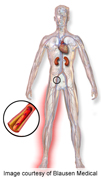- Could Your Grocery Store Meat Be Causing Recurring UTIs?
- Are You Making This Expensive Thermostat Error This Winter?
- Recognizing the Signs of Hypothyroidism
- 10 Strategies to Overcome Insomnia
- Could Artificial Sweeteners Be Aging the Brain Faster?
- Techniques for Soothing Your Nervous System
- Does the Water in Your House Smell Funny? Here’s Why
- Can a Daily Dose of Apple Cider Vinegar Actually Aid Weight Loss?
- 6 Health Beverages That Can Actually Spike Your Blood Sugar
- Treatment Options for Social Anxiety Disorder
Inflammatory Muscle Disorder May Raise Risk for Heart Attack, Stroke


A common inflammatory muscle disorder that causes pain and stiffness in older people may increase the risk for heart attack and stroke, new research suggests.
A British study found that patients with polymyalgia rheumatica are more likely to develop vascular disease — conditions that affect the blood vessels. Doctors should carefully manage the vascular risk factors of patients with polymyalgia rheumatica to reduce their risk for complications, the study authors concluded.
Unlike other inflammatory diseases such as rheumatoid arthritis and systemic lupus, the link between polymyalgia rheumatica and an increased risk for vascular disease has not been well-established.
“Polymyalgia rheumatica is one of the most common inflammatory rheumatologic conditions in older adults,” the study authors wrote. To date, evidence regarding the risk of vascular disease in patients with polymyalgia rheumatica is unclear.”
To gain a better understanding of the association, the researchers examined data compiled from nearly 3,250 patients with the inflammatory muscle disorder and more than 12,700 people without the condition.
None of the people involved in the study had a history of vascular disease. The patients were followed for roughly three to 12 years.
The study, published July 28 in the CMAJ, revealed the patients with polymyalgia rheumatica are at higher risk for all forms of vascular disease, including angina, heart attack, atherosclerosis and stroke.
The risk for these conditions peaked six to 12 months after being diagnosed with the inflammatory muscle disorder. The results were similar for men and women, said the researchers, led by Dr. Christian Mallen, of Keele University in Staffordshire, England.
The patients at greatest risk were younger — between 50 and 59 years old, the researchers said. These participants had a more than fivefold increased risk for vascular disease. In contrast, those 80 and older had a threefold increased risk.
“This early excess risk provides insight into potential mechanisms and supports the link between inflammation and vascular disease, given that the inflammatory burden in polymyalgia rheumatica is highest in early disease,” the study authors wrote.
More information
The American College of Rheumatology provides more information on inflammatory muscle disease.
Source: HealthDay
Copyright © 2026 HealthDay. All rights reserved.










